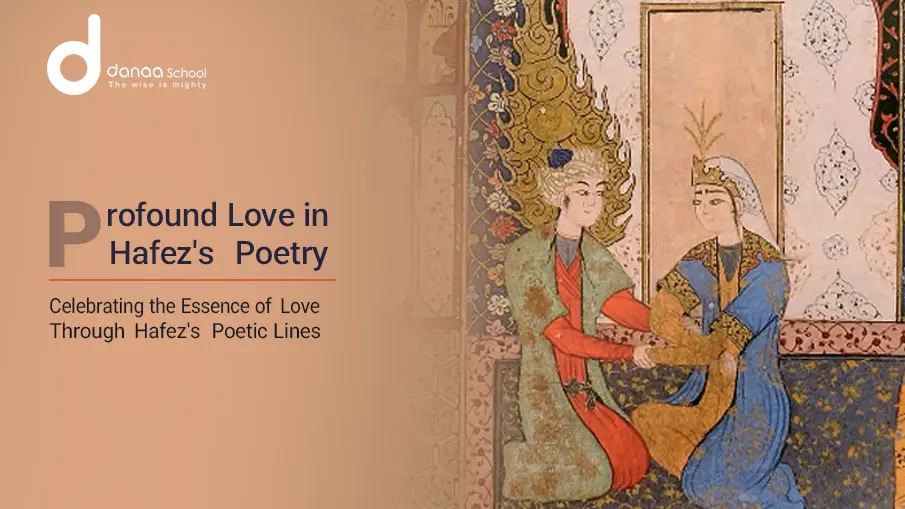Hafez, the celebrated Persian poet, is a central figure in classical Persian literature. Born in Shiraz in the 14th century, Hafez’s poetry—primarily composed of ghazals—captures the essence of love, spirituality, and the human experience. His verses are rich in symbolism and mystical insight, making them a timeless source of inspiration and reflection.
Who Was Hafez?
Khwāja Shams-ud-Dīn Muḥammad Ḥāfeẓ-e Shīrāzī, commonly known as Hafez, was born around 1315 in Shiraz. His pen name, “Hafez,” refers to someone who has memorized the Quran—an achievement he reportedly attained at a young age. Growing up in Shiraz, a city renowned for its cultural and intellectual vibrancy, deeply influenced his poetic development.
Hafez’s poetry is distinguished by its layered meanings, subtle wordplay, and deep spiritual reflection. Although many details of his personal life remain uncertain, his verses offer profound insight into his worldview, beliefs, and observations of society.
The Cultural Context of Hafez’s Poetry
Hafez lived during a period marked by political upheaval following the Mongol invasions and the rise of the Timurid era. His poetry reflects this turbulent social landscape, often criticizing hypocrisy, corruption, and rigid religious authority through metaphor and allegory—messages that continue to resonate today.
What Is Hafez Poetry?
Hafez’s poetry is defined by its profound fusion of mysticism, love, and existential inquiry. His ghazals explore both the spiritual and worldly dimensions of life, using intricate metaphors and symbolic language to express universal human longing and divine love.
A defining feature of Hafez’s work is its balance between Sufi mysticism and worldly pleasure. His verses offer philosophical depth while celebrating the beauty and impermanence of life, allowing his poetry to transcend time, culture, and geography.
Love and Mysticism in Hafez’s Poetry
At the heart of Hafez’s poetry lies the theme of love—both earthly and divine. His ghazals passionately explore love’s beauty, pain, and transformative power. Earthly love in his work often serves as a metaphor for divine union, blurring the boundary between human desire and spiritual longing.
Example of Love and Mysticism
“I have learned so much from God
That I can no longer call myself
A Christian, a Hindu, a Muslim,
A Buddhist, a Jew.”
In these lines, Hafez transcends religious identity, expressing a universal mystical vision rooted in divine love and unity.
Symbolism and Allegory in Hafez’s Poetry
Hafez’s poetry is renowned for its rich symbolic language. Common symbols include wine, representing spiritual ecstasy or divine love; the beloved, symbolizing both a human lover and the divine; and the nightingale and rose, expressing longing for beauty and truth.
Symbolic Imagery Example
“The nightingale sings, ‘Let’s fill the cup,’
The rose replies, ‘The world is a bubble.’
I answer, ‘The world is my lover—
Bubble or cup, let us drink it up.’”
Here, Hafez reflects on life’s transience while affirming joy, love, and presence despite impermanence.
Hafez’s Influence on Persian Literature
Hafez’s influence on Persian literature is immeasurable. His Divan remains a central text in Persian culture and is often used for reflection and guidance through the practice of fal-e Hafez (bibliomancy).
Hafez in the Modern World
Today, Hafez’s poetry continues to be read, recited, and translated worldwide. His verses speak to modern audiences with the same emotional depth and spiritual insight that captivated readers centuries ago.
How to Appreciate Hafez’s Poetry
To fully appreciate Hafez’s poetry, readers should explore its cultural and historical context, symbolic language, and musical rhythm. Reading his verses aloud and reflecting on multiple layers of meaning can greatly enrich the experience.
Learn Persian Poetry with Danaa School
At Danaa School, we offer dedicated courses and workshops on Persian literature, including the poetry of Hafez. Our programs guide learners through the themes, symbolism, and historical background of his work, helping them build a deeper and more meaningful connection with classical Persian poetry.
FAQs
What is Hafez famous for?
Hafez is famous for his lyrical poetry, which masterfully blends themes of love, mysticism, and existential reflection.
Is Hafez the same as Rumi?
No, Hafez and Rumi are different poets. Both are celebrated Persian poets, but Rumi is known for his Sufi mystical poetry, while Hafez is renowned for his ghazals that often explore the complexities of love and life.
Why is he called Hafez?
He is called Hafez because he had memorized the Quran by heart, as “Hafez” means “memorizer” or “guardian” in Arabic.
Is it Hafiz or Hafez?
Both “Hafiz” and “Hafez” are correct; “Hafez” is the Persian transliteration, while “Hafiz” is the Arabic form.
Who is Iran's most famous poet?
Hafez is often considered Iran’s most famous poet, though Rumi and Ferdowsi are also highly esteemed.
Who is Hafiz in Iran?
Hafiz is a revered Persian poet known for his beautiful and complex ghazals that explore themes of love, spirituality, and the human condition.
Conclusion
Hafez’s poetry offers a window into the heart and soul of Persian culture, blending mysticism, love, and wisdom in verses that have stood the test of time. Whether you are a seasoned reader of Persian literature or new to Hafez’s work, his poetry invites you to explore the depths of human experience and the mysteries of the divine.
Enrich your literary journey with Danaa School’s unique offerings and uncover the timeless beauty of Hafez’s poetry. Dive into our courses and workshops to explore Persian literature like never before!










